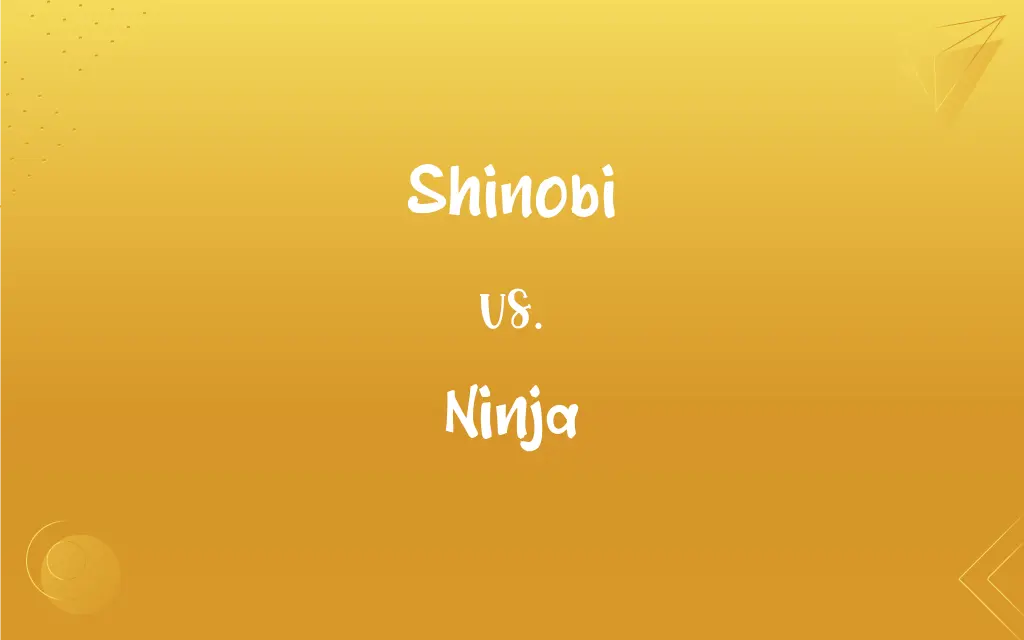Shinobi vs. Ninja: What's the Difference?
Edited by Harlon Moss || By Janet White || Updated on June 11, 2024
"Shinobi" and "Ninja" both refer to covert agents in feudal Japan skilled in espionage and guerrilla warfare, essentially being synonymous.

Key Differences
"Shinobi" is believed to be derived from the Japanese verb "shinobu," which means "to sneak" or "to hide," emphasizing the stealthy nature of these agents. In contrast, "Ninja" is more universally recognized and utilized, especially in pop culture, to signify these shadowy figures.
Both "Shinobi" and "Ninja" are part of ancient Japanese history and folklore, representing individuals trained not just in combat, but also in various disciplines like medicine, information gathering, and survival. They were often called upon to perform tasks that samurai, bound by their code, would not.
The image of the "Shinobi" often invokes a sense of mystery and is sometimes used to denote a more historical or authentic representation of these agents. On the other hand, the term "Ninja" has been largely commercialized, often appearing in films, games, and other media, sometimes straying from historical accuracy.
It's crucial to understand that both "Shinobi" and "Ninja" refer to the same historical profession and skill set. The choice between these terms often boils down to linguistic or stylistic preference, with "Ninja" being more common in global discourse.
Comparison Chart
Origination
Derived from "shinobu" meaning "to sneak" or "to hide"
More universally recognized term
ADVERTISEMENT
Usage
More historically nuanced
Widely commercialized in pop culture
Representation
Stealthy, covert agent in feudal Japan
Espionage agent, often portrayed in films and games
Tasks
Espionage, sabotage, and covert operations
Similar tasks, but often depicted with fantastical abilities in media
Cultural Recognition
More common in authentic or historical contexts
Recognized globally, often with pop culture and entertainment value
Shinobi and Ninja Definitions
Shinobi
An individual trained in stealth and espionage.
The shinobi moved silently, avoiding detection.
ADVERTISEMENT
Ninja
A popular figure in films, games, and comics, often with exaggerated skills.
The ninja in the video game could scale walls with ease.
Shinobi
A covert agent in feudal Japan.
The shinobi was tasked with infiltrating the enemy castle.
Ninja
A term synonymous with shinobi but more globally recognized.
The ninja has become an iconic figure in pop culture.
Shinobi
A historical figure skilled in guerrilla warfare.
The shinobi used unconventional tactics to achieve his goals.
Ninja
A covert agent from feudal Japan skilled in espionage.
The ninja was known for his silent and deadly approach.
Shinobi
A practitioner of ninjutsu, the art of the ninja.
As a shinobi, he mastered the techniques of his ancestors.
Ninja
An individual trained in ninjutsu, a martial art focusing on stealth.
The young ninja spent years honing his skills.
Shinobi
A term emphasizing the stealthy nature of Japanese covert agents.
The shinobi's primary strength was his ability to blend into shadows.
Ninja
A member of a class of medieval Japanese mercenary agents who were trained in the martial arts and hired for covert operations such as assassination and sabotage.
Shinobi
A male ninja.
Ninja
(martial arts) A person trained in ninjutsu, especially (historical) one used for espionage, assassination, and other tasks requiring stealth during Japan's shogunate period.
Ninja
(figurative) A person considered similarly skillful to the historical ninja, especially in covert or stealthy operation.
Ninja
(figurative) A person considered to look like the historical ninja in some way, including amateur private miners.
Ninja
Syn of manas a friendly term of address.
What up, my ninja!
Ninja
Of or related to ninjas in their various senses.
Ninja
(ambitransitive) To act or move like a ninja, particularly with regard to a combination of speed, power, and stealth.
Ninja
Syn of preempt: to supersede and invalidate a response by posting immediately before it.
When I hit post, I saw that Blue Emu had ninja'd me, so I just deleted my reply.
Ninja
To claim an item through abuse of game mechanics.
That damn warrior ninja'd an epic-quality wand even though he can't even use it!
Ninja
A member of the ninja who were trained in martial arts and hired for espionage or sabotage or assassinations; a person skilled in ninjutsu
Ninja
A class of 14th century Japanese who were trained in martial arts and were hired for espionage and assassinations
Ninja
Someone adept at moving unseen and gathering information.
His ability to gather intel was akin to that of a ninja.
FAQs
Did Shinobi and Ninja have similar roles in history?
Yes, both were skilled in espionage, sabotage, and guerrilla warfare.
Is "Ninja" more popular in global culture?
Yes, "Ninja" is more universally recognized, especially in pop culture.
Are "Shinobi" and "Ninja" different?
Essentially, they refer to the same covert agents in feudal Japan.
Has the portrayal of the "Ninja" in media always been accurate?
No, the term "Ninja" has been commercialized and often depicted with exaggerated skills.
Is "Ninjutsu" the art practiced by both Shinobi and Ninja?
Yes, "Ninjutsu" is the martial art and tactics of the ninja or shinobi.
Were Shinobi always in opposition to samurai?
No, while they had different roles, they sometimes worked for the same lords.
Were both Shinobi and Ninja always male?
No, there were female agents called "kunoichi."
Does "Shinobi" have a specific origin?
Yes, it's derived from the verb "shinobu," meaning "to sneak" or "to hide."
Are there schools today that teach the ways of the Shinobi?
Yes, some schools claim to teach traditional ninjutsu or the ways of the shinobi.
Were Ninja and Shinobi considered honorable in their time?
Their roles were essential, but they weren't bound by the samurai's code of honor and could employ methods considered "dishonorable."
Is the portrayal of "Shinobi" in media more authentic than "Ninja"?
Generally, "Shinobi" is used in more historical or authentic contexts, but not always.
Is "Ninja" more a term of entertainment now?
Largely, yes. It's widely used in media and entertainment, sometimes deviating from historical facts.
Is every portrayal of "Shinobi" historically accurate?
No, like "Ninja," "Shinobi" can also be romanticized or exaggerated in media.
In modern terms, could a "Ninja" be considered a spy?
In some ways, yes, as both engage in covert operations and information gathering.
How have Ninjas become global icons?
Their unique skills, mysterious nature, and portrayal in global media have contributed to their iconic status.
Do both terms have roots in the Japanese language?
Yes, both "Shinobi" and "Ninja" are of Japanese origin.
How did Shinobi and Ninja gather information?
Through espionage, disguise, eavesdropping, and various stealthy methods.
About Author
Written by
Janet WhiteJanet White has been an esteemed writer and blogger for Difference Wiki. Holding a Master's degree in Science and Medical Journalism from the prestigious Boston University, she has consistently demonstrated her expertise and passion for her field. When she's not immersed in her work, Janet relishes her time exercising, delving into a good book, and cherishing moments with friends and family.
Edited by
Harlon MossHarlon is a seasoned quality moderator and accomplished content writer for Difference Wiki. An alumnus of the prestigious University of California, he earned his degree in Computer Science. Leveraging his academic background, Harlon brings a meticulous and informed perspective to his work, ensuring content accuracy and excellence.
































































